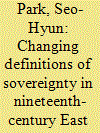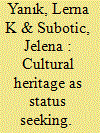| Srl | Item |
| 1 |
ID:
121730


|
|
|
|
|
| Publication |
2013.
|
| Summary/Abstract |
The arrival of Westphalian sovereignty principles in nineteenth-century East Asia was not a uniformly transformative "shock" as commonly assumed. The Sino-centric order did not suddenly disappear; rather it lingered and evolved in a gradual and contested process of change. I argue that enduring domestic understandings of sovereign autonomy affected how Westphalian sovereignty was interpreted in Japan and Korea. Even as the regional structure shifted from regional hierarchy under China to a Western-led international state system, the lens of hierarchy-the long-standing sense of vulnerability and the need to attain autonomous status in a world of great powers-remained unchanged. In addition, each ruling regime in East Asia attempted to reconcile Westphalian sovereignty with existing diplomatic practices to protect its own interests within the Sino-centric order, which resulted in a new hybrid system of interstate relations encompassing notions of both equality and civilizational hierarchy. Within each country, contestation on sovereignty occurred in multiple stages, driven by existing security relationships and changing domestic politics debating the competing standards of civilization in the region.
|
|
|
|
|
|
|
|
|
|
|
|
|
|
|
|
| 2 |
ID:
181531


|
|
|
|
|
| Summary/Abstract |
This article explores the relationship between cultural heritage politics and international status-seeking. We advance a two-fold typology of status-seeking that explains why states engage in cultural heritage restoration practices at home and abroad. First, cultural heritage restoration can be an easy way to signal state respect of its multicultural past while providing cover for continuing anti-multicultural policies of the present. States with uncertain, challenged, or liminal international status use cultural heritage projects as a ‘standard of civilization’ of democracy, displaying themselves on the international stage as worthy of status and respect. Cultural heritage here is used as a strategy for international status affirmation. Second, states may engage in cultural heritage restoration beyond their borders, supporting or directly managing renovation of these sites in order to expand their imagined national cultural, political, and economic domain. Cultural heritage restoration projects here serve as a backdrop for powerful international economic alliances that can be used for status substitution—replacing one status-generating benchmark of ‘standard of civilization’ with another—economic prosperity. We illustrate these arguments with two recent cases of cultural heritage restoration that involve Turkey: the ‘Akdamar’ Church in Van, Turkey and the Tomb of Gül Baba in Budapest, Hungary.
|
|
|
|
|
|
|
|
|
|
|
|
|
|
|
|
| 3 |
ID:
077417


|
|
|
|
|
| Publication |
2007.
|
| Summary/Abstract |
International Relations benefits from historical comparative research. Although a historical comparative method can be fruitfully applied to the study of the European Union (EU), it is rarely undertaken. In this article, EU accession politics, particularly its 2004 enlargement, is compared with 19th century `standards of civilization' developed by European states concluding treaties with non-European nations. This article argues that EU accession politics operates in the legacies of 19th-century imperial rule. Understanding the EU in terms of an (new) empire might enrich the discussion of the perception and categorization of the EU as an international order.
|
|
|
|
|
|
|
|
|
|
|
|
|
|
|
|
| 4 |
ID:
077415


|
|
|
|
|
| Summary/Abstract |
International Relations benefits from historical comparative research. Although a historical comparative method can be fruitfully applied to the study of the European Union (EU), it is rarely undertaken. In this article, EU accession politics, particularly its 2004 enlargement, is compared with 19th century `standards of civilization' developed by European states concluding treaties with non-European nations. This article argues that EU accession politics operates in the legacies of 19th-century imperial rule. Understanding the EU in terms of an (new) empire might enrich the discussion of the perception and categorization of the EU as an international order.
|
|
|
|
|
|
|
|
|
|
|
|
|
|
|
|
| 5 |
ID:
077416


|
|
|
|
|
| Summary/Abstract |
International Relations benefits from historical comparative research. Although a historical comparative method can be fruitfully applied to the study of the European Union (EU), it is rarely undertaken. In this article, EU accession politics, particularly its 2004 enlargement, is compared with 19th century `standards of civilization' developed by European states concluding treaties with non-European nations. This article argues that EU accession politics operates in the legacies of 19th-century imperial rule. Understanding the EU in terms of an (new) empire might enrich the discussion of the perception and categorization of the EU as an international order.
|
|
|
|
|
|
|
|
|
|
|
|
|
|
|
|